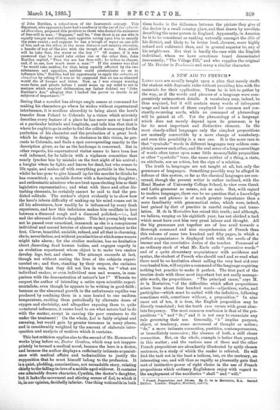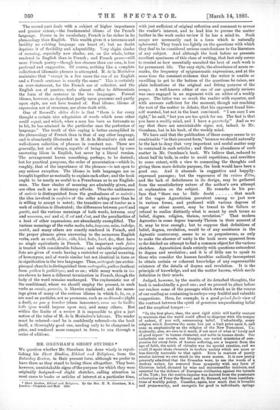A NEW AID TO FRENCH.*
LANGUAGES are usually taught upon a plan that merely stuffs the student with dogmatic rules without providing him with the materials for their application. These he is left to gather by the way, as if the words and phrases of a language were comparatively unimportant details. A vocabulary may, indeed, be thus acquired, but it will contain many words of infrequent usage and lack most of those employed for common and constantly-recurring needs, while no command of phraseology will be gained at all. Yet the phraseology of a language which does not merely depend upon its grammar, is by far its most important and distinctive element. In the most closely-allied languages only the simplest propositions are mutually convertible by a mere change of vocabulary, and even this possibility is a rare one. It is the more rare in that "symbolic" words in different languages very seldom completely answer each other, and the real sense of a long assemblage of words often turns upon some little monosyllabic preposition or other " symbolic" term, the name neither of a thing, a state, an attribute, nor an action, but the sign of a relation.
The truth is, languages are not taught at all, but only the grammars of languages. Something possibly may be alleged in defence of this system, so far as the classical languages are concerned, though the present writer is rather inclined, with the Head Master of University College School, to view even Greek and Latin grammar as means, not as ends. Bat, with regard to modern languages, there can be no question that a knowledge of words and phrases is of much greater importance than a mere familiarity with grammatical roles, which were, indeed, best gained by dint of practice in careful reading and translation. M. de la Moriuiere has seized this truth ; and although, we believe, verging on his eightieth year, has not shirked a task which mast have cost him very great labour and thought. All the big grammars put together are of less avail towards a thorough command and nice comprehension of French than this volume of some two hundred and fifty pages, in which a perfect acquaintance is displayed both with the needs of the learner and the correlative duties of the teacher. Possessed of an ordinary stock of what Mr. Earle calls " preseutive words" and of a quite elementary acquaintance with accidence and syntax, the student of French who should read and re-read what there need be no hesitation about calling the very best aid ever vouchsafed him, will acquire a command of the language requiring nothing but practice to make it perfect. The first part of the treatise deals with those most important but not easily manageable words, the prepositions. "The principal cause," says M. de la Moriniere, " of the difficulties which affect prepositions arises from about four hundred words—adjectives, verbs, and participles—which must be united with the infinitive, following sometimes with, sometimes without, a preposition." In nine cases out of ten, it is true, the English preposition may be directly translated ; but the tenth case recurs with great absolute frequency. The most common confusion is that of the prepositions " ii " and " de ;" and it is not easy to:enunciate any rule governing their use. Generally, "1" implies purpose, object, or tendency, some movement of thought or action ; "de," a more intimate connection, partitive, contemporaneous, or immediately successive ; the absence of both, a still closer connection. But, on the whole, example is better than precept in this matter; and the various uses of these and the other French prepositions are abundantly illustrated by aptly-chosen sentences, to a study of which the reader is referred. He will find the task not in the least a tedious, but, on the contrary, an interesting one, and will thus as rapidly as pleasantly gain that sort of instinctive power of right choice in the use of French prepositions which ordinary Englishmen enjoy with regard to the employment of the auxiliaries " shall " and " will." The second part deals with a subject of higher importance and greater extent,—the fundamental idioms of the French language. Poorer in its vocabulary, French is far richer in its phraseology than English. This wealth gives it a terseness and lucidity no existing language can boast of; but no doubt deprives it of flexibility and adaptability. Very slight shades of meaning, especially new shades, are, on the whole, better rendered in English than in French ; and French prose—still more French poetry—though less obscure than our own, is less profound and suggestive. Of course, nothing like a complete collection of idiomatic phrases is attempted. M. de la Moriniere maintains that " except in a few cases the run of an English and a French sentence is exactly the same." This is certainly an over-statement, for the French use of reflective, and the English use of passive, verbs almost suffice to differentiate the form of the sentence in the two languages. Formal idioms, however, as dependent partly upon grammar and partly upon style, are not here treated of. Real idioms, idioms of expression not of structure, are alone dealt with.
One of Boswell's obiter dicta is that "there is for every thought a certain nice adaptation of words which none other could equal, and which, when a man has been so fortunate as to hit, he has attained in the particular case the perfection of language." The truth of this saying is better exemplified in the phraseology of French than in that of any other language, and is abundantly illustrated in M. de la Moriniere's rich and well-chosen collection of phrases in constant use. These are generally, but not always, capable of being rendered by some answering idiom in English, but never by a literal version. The arrangement leaves something, perhaps, to be desired; but for practical purposes, the order of presentation—which is, roughly, that of the importance of the phrases—is not open to any serious exception. The idioms in both languages are so brought together as mutually to explain each other; and the book ought to be nearly as useful to a Frenchman as to an Englishman. The finer shades of meaning are admirably given, and .are often such as no dictionary affords. Thus the suddenness of noircir is distinguished from the gradualness of se noircir; the idea involved in suifaire of the seller asking more than he is willing to accept is noted; the transitive use of Comber as a verb of criticism is illustrated; the differences between parti and pantie, and the various meanings of both words, between neuf and nouveau, oui and si, it est and c'est, and the peculiarities of a host of other expressions, are abundantly exemplified. The various meanings of the verbs make, take, improve, miss, indulge, match, and many others are exactly rendered in French, and the proper phrases given answering to the numerous English verbs, such as walk, drive, ride, hint, bake, hurt, &c., that have no single equivalents in French. The important verb faire is treated with considerable fulness ; and valuable explanatory lists are given of words having a restricted or special meaning, of homonyms, and of words similar but not identical in form or in signification in the two languages. Thus, netropole (an archiepiscopal church) is distinguished from metropolis, pathos (bathos) from pathos le pathetique, and so on ; while many words in ion are shown to have a different termination in French, though the body of the word remains unchanged. The euphemistic use of the conditional, where we should employ the present, in such verbs as savoir, pouvoir, is likewise explained ; and the meanings given of many of the curious idioms in which le, ice, en, y are used as particles, not as pronouns, such as en decoudre (fight a duel), ne pas y toucher (sham innocence), vows me la baillez belle (you would impose upon me), and many others. But within the limits of a review it is impossible to give a just notion of the value of M. de la Moriniere's labours. The reader must be referred—and he is confidently referred—to the book itself, a thoroughly good one, needing only to be cheapened in price, and rendered more compact in form, to run through a series of editions.



































 Previous page
Previous page